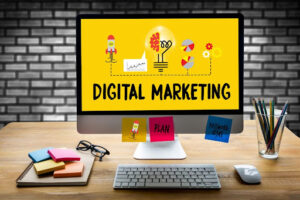
By 2030, marketing is expected to be highly personalized and data-driven, with AI playing a central role in shaping strategies. AI will likely automate routine tasks, allowing marketers to focus on creativity and strategy, while enhancing customer experiences through advanced chatbots and virtual assistants. Predictive analytics will help anticipate market trends, and generative AI will enable rapid, tailored content creation across media. Ethical considerations, such as data privacy and transparency, will be essential, alongside a focus on sustainability. Surprisingly, AI may also optimize voice search and use blockchain for securing marketing data, like in influencer campaigns.
Customer Interaction and Content Creation
AI-powered chatbots are expected to handle most customer interactions, offering instant, personalized responses. Generative AI will create customized content, from emails to videos, at scale, adapting to individual preferences and behaviors. This could revolutionize how brands connect with audiences, making marketing more dynamic and responsive.
Data Analysis and Ethical Considerations
AI will analyze vast datasets in real time, predicting customer behavior and optimizing strategies. However, this raises ethical issues, such as ensuring data privacy and avoiding algorithmic biases, which brands will need to address transparently to maintain trust.
Detailed Analysis
This section draws from extensive research and trends to explore how marketing might evolve by 2030 with the rise of AI. It expands on the key points and includes detailed insights, supported by data and examples, to offer a thorough understanding for professionals and enthusiasts alike.
Current State of AI in Marketing
AI is already transforming marketing, with applications in data analysis, customer segmentation, and personalized advertising. For instance, a 2024 report from MarketingHire highlights that only one-third of marketing organizations currently use AI for optimizing digital content and media buying, indicating underutilization. Another study by IBM notes AI’s role in enhancing customer experiences through natural language processing and machine learning, with a projected economic impact of over $15 trillion by 2030. These tools are automating tasks like social media analytics, as seen in Sprout Social reports, where AI-driven social listening is improving efficiency.
Predicted Trends for 2030
By 2030, research suggests marketing will be characterized by hyper-personalization, driven by AI’s ability to analyze behavioral, demographic, and psychographic data. A Forbes article predicts AI will create marketing content tailored to factors like current mood or weather, enhancing engagement. Generative AI, expected to reach a market size of $19.1 billion by 2030 according to KBV Research, will enable rapid production of personalized videos, emails, and ads, as noted in a LinkedIn Pulse post.
Customer interactions will likely shift to AI-powered chatbots and virtual assistants, with a 2025 ContentGrip prediction suggesting they’ll manage 85% of interactions by then, a trend expected to grow. Predictive analytics, as discussed in Gartner, will forecast trends, enabling real-time strategy adjustments, while augmented and virtual reality, personalized via AI, will offer immersive experiences, per Oppizi.
Ethical and Technical Challenges
Ethical concerns, such as data privacy and algorithmic bias, will be critical. A CMSWire article warns of biases leading to ineffective campaigns, while IBM emphasizes compliance with privacy laws. High investment costs and the need for quality data, as noted in Marketing Insider Group, pose challenges, especially for smaller businesses. However, solutions like cloud-based AI and third-party vendors are emerging, per HubSpot Blog.
Unexpected Applications
An interesting development is AI’s potential in voice search optimization, with Think with Google predicting its rise as voice assistants grow, and blockchain for securing marketing data, such as in influencer campaigns, as suggested by Grand View Research. These applications could redefine how brands ensure authenticity and reach audiences.
Supporting Data and Market Projections
The global AI market is projected to reach $1.81 trillion by 2030, with a CAGR of 37.3%, per Forbes Advisor India, and the AI in marketing market is expected to grow to $72.1 billion, with a 24.5% CAGR, according to Zion Market Research. McKinsey’s 2023 report, The economic potential of generative AI, estimates generative AI could add $2.6 trillion to $4.4 trillion annually, with marketing and sales leading value creation.
Table: Key AI Marketing Trends and Projections
| Trend | Description | Projected Impact by 2030 | Source |
|---|---|---|---|
| Personalization | Tailored content via AI analysis | Hyper-personalized customer experiences | Forbes |
| Chatbot Interactions | AI handling customer queries | 85% of interactions automated | ContentGrip |
| Generative Content Creation | AI-generated videos, emails, ads | Market size $19.1 billion | KBV Research |
| Predictive Analytics | Forecasting trends and behaviors | Real-time strategy adjustments | Gartner |
| Ethical Concerns | Privacy, bias, transparency | Increased regulation and trust-building | CMSWire |
| Voice Search Optimization | AI adapting to natural language queries | Growing with voice assistant adoption | Think with Google |
| Blockchain for Data Security | Ensuring authenticity in campaigns | Enhanced trust in influencer marketing | Grand View Research |
This table summarizes key trends, their descriptions, projected impacts, and sources, providing a structured overview for stakeholders.
In conclusion, by 2030, AI will likely be integral to marketing, driving efficiency and innovation, while addressing challenges through technological advancements and ethical frameworks. This aligns with McKinsey’s findings on AI’s transformative potential, as seen in The state of AI in 2023, emphasizing marketing’s role in value creation.





